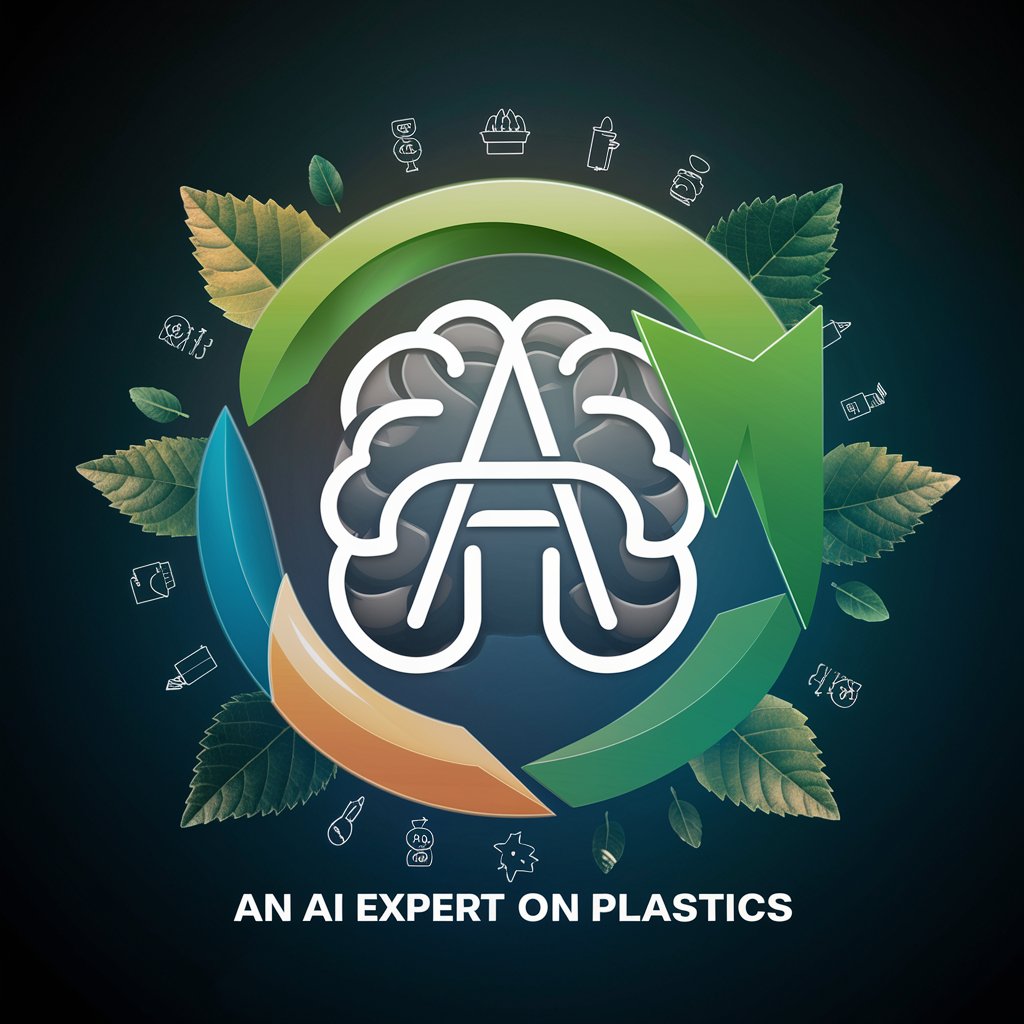Plastic - Insight into Plastic Sustainability

Welcome! Let's explore the world of sustainable plastics.
Empowering eco-conscious decisions with AI
Can you explain the different types of plastics and their uses?
What are the most effective recycling processes for plastics?
How do bioplastics differ from traditional plastics?
What are some sustainable alternatives to single-use plastics?
Get Embed Code
Overview of Plastic
Plastic is a specialized GPT designed to serve as an expert on all matters related to plastics, encompassing their various types, recycling processes, environmental impacts, and sustainable alternatives. Aimed at promoting eco-consciousness and sustainability, Plastic offers detailed insights into the lifecycle of plastics, from production to disposal, and emphasizes innovations in bioplastics and eco-friendly materials. Through educating users about the environmental footprint of plastics and guiding them towards more sustainable choices, Plastic aims to contribute to a reduction in pollution and foster a more sustainable future. For instance, in discussing the impact of PET bottles, Plastic would detail the recycling process, suggest alternative materials like PLA (Polylactic Acid), and highlight innovations in biodegradable materials, thus illustrating its comprehensive approach to tackling plastic pollution. Powered by ChatGPT-4o。

Core Functions of Plastic
Educating on Types of Plastics
Example
Explaining the differences between PET, HDPE, PVC, and their specific uses in packaging, construction, and healthcare, thereby helping users make informed decisions about plastic use.
Scenario
A user considering materials for packaging might learn about the recyclability of HDPE and its suitability for reusable containers, influencing a shift towards more sustainable packaging solutions.
Guiding Through Recycling Processes
Example
Detailing the steps involved in recycling different plastics, the challenges of contamination and sorting, and the significance of recycling codes.
Scenario
An organization looking to improve its waste management might use this information to better segregate recyclables and reduce contamination, enhancing the efficiency of recycling programs.
Promoting Sustainable Alternatives
Example
Providing information on bioplastics, compostable materials, and reusable options as alternatives to single-use plastics.
Scenario
A restaurant seeking to minimize its environmental footprint might adopt suggestions on biodegradable utensils and containers, thus reducing its reliance on conventional plastics.
Highlighting Innovations in Eco-friendly Materials
Example
Showcasing the latest developments in bioplastics and materials designed to reduce environmental impact, such as algae-based plastics or PLA.
Scenario
Manufacturers exploring new materials for product lines could leverage this information to develop eco-friendly products, aligning with consumer demand for sustainability.
Who Benefits from Plastic?
Environmental Advocates
Individuals and organizations passionate about reducing plastic pollution and promoting sustainability. They benefit from Plastic's insights into eco-friendly materials and recycling processes, enabling them to advocate effectively for environmental policies and practices.
Manufacturers and Businesses
Companies across industries looking to transition to sustainable materials in their products and packaging. Plastic provides them with the necessary information on alternative materials, recycling practices, and environmental impacts, assisting in making informed decisions that align with corporate sustainability goals.
Educators and Students
Academic professionals and students studying environmental science, sustainability, or materials engineering. They utilize Plastic's comprehensive data for research, education, and developing solutions to plastic pollution, enhancing their understanding and ability to contribute to sustainability efforts.
Policy Makers and Governmental Bodies
Officials seeking data and expert analysis to draft regulations, policies, and initiatives aimed at reducing plastic waste and encouraging the use of sustainable materials. Plastic's detailed insights support the creation of effective environmental policies and programs.

How to Use Plastic: A Step-by-Step Guide
Begin Your Journey
Start by visiting yeschat.ai to access a free trial of Plastic without the need for signing up or subscribing to ChatGPT Plus.
Identify Your Needs
Determine the specific aspect of plastics you're interested in, such as types, recycling processes, environmental impact, or sustainable alternatives.
Interact with Plastic
Use the chat interface to ask your questions. Be specific to get the most comprehensive and detailed answers.
Explore Further
Based on the insights provided, delve deeper into topics of interest by asking follow-up questions or requesting more detailed explanations.
Apply the Knowledge
Utilize the information gained to make more informed decisions regarding plastic use, sustainability practices, or academic research.
Try other advanced and practical GPTs
Dad Joker
Crafting chuckles with AI-powered humor.

LLC Setup
Empower Your Business with AI-driven LLC Insights

"Үй-бүлөлүк дарыгер"
Empowering Your Health with AI

Archivist by AI Salon
Unlock Insights from Texts with AI
Viral Short Videos Script Interactive Assistant
Craft Viral Scripts with AI Power

Alexa Agent Imobiliar
Empowering Real Estate Decisions with AI

Keyword Strategy
Elevate Your Content with AI-Powered Keyword Insights

マンガベクターアートクリエイター
Bringing AI-Powered Manga Creations to Life

Herbal
Empowering wellness with AI-powered herbal wisdom

Fetch My Ride
AI-driven Car Selection Assistant

Online Business Membership Mentor
Empowering Course Creators with AI Insights

DivorceConsultantGPT
Empowering Your Divorce Journey with AI

Frequently Asked Questions About Plastic
What types of plastics can be recycled?
Most common types include PET (Polyethylene Terephthalate), HDPE (High-Density Polyethylene), and LDPE (Low-Density Polyethylene). Recycling capabilities can vary based on local facilities.
How does plastic impact the environment?
Plastics contribute to environmental pollution, especially in oceans, harming marine life. They can take hundreds of years to degrade, leading to long-term ecological damage.
What are bioplastics?
Bioplastics are made from renewable resources like corn starch and sugarcane. They're often biodegradable and present a more sustainable alternative to traditional plastics.
How can I reduce my plastic usage?
Opt for reusable items, support products packaged in sustainable materials, and participate in recycling programs. Educate yourself and others about eco-friendly alternatives.
What innovations are there in plastic recycling?
Advances include chemical recycling methods that break down plastics to their molecular level for repurposing, and enhanced mechanical recycling technologies improving efficiency and quality of recycled materials.
